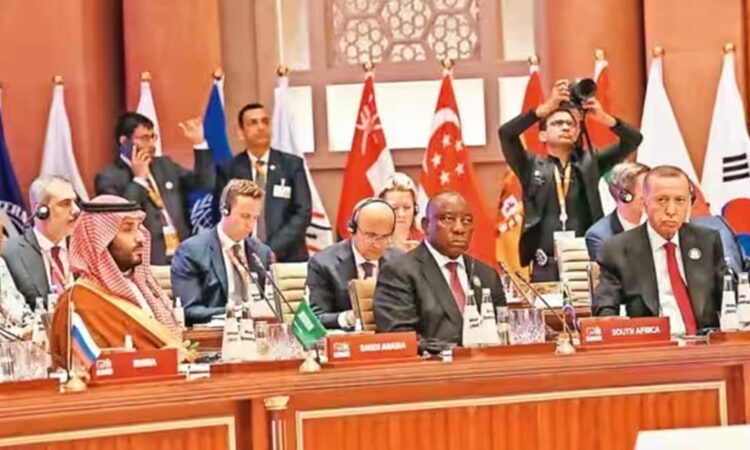
The singular act of admitting the largest developing country regional grouping — the African Union (AU) — into the G20, has given its 18th Summit under India’s dynamic presidency a special place in the history of global economic and financial governance. In one stroke, the second-largest continent, Africa, with a population more than that of India and China, gets wholly represented in an elite decision-making body.
It adds to the sheen of Bharat G20 being the most ambitious of presidencies with 111 outcomes and presidency documents, tripling the substantive work for India, the Global South and the global kutumbakam.
AU’s entry as the 21st entity, adds weight and potential. G20 now covers nearly 80 per cent of the world’s population, has 97 out of the UN’s 193 countries, 88 per cent of GDP and 79 per cent of trade share. It balances the developed country regional grouping of 27 countries, the EU.
It raises the stature and credibility of G20 and improves the implementation of its policies, programmes, measures, principles and initiatives. The beauty of the move is that the expansion makes the G20 vastly more representative without making it unwieldy because only one leader will represent the AU.
It gives Africa voice, participation and leadership at the global high table, where, as an African leader said, its developmental, financial, economic and environmental challenges — and solutions, too — are invariably on the menu. Now, Africans will get to design the menu and what is finally served up. Most importantly, Africa has 33 out of 46 Least Developed Countries and faces widespread poverty, conflict, political instability, climate stress, environmental degradation, and socioeconomic devastation from Covid, food, fuel, debt and financial crisis.
So it needs G20 assistance with global public goods — finance, technology, investment and capacity building in keeping with the Indian principle of “from Sarvodaya to Antodaya” and the SDG principle of reaching the farthest first as the answer to leaving no one, no country and no continent behind.
Africa is also one of the richest continents in terms of resources — agricultural land, minerals, metals, including rare earth, and youth power. It has been growing steadily and integrating economically and politically. It launched a Free Trade Area in 2018 and adopted an ‘Agenda 2063: The Africa We Want’ — a blueprint and master plan for transforming the continent into a powerhouse. Africa is a key to the world achieving the SDGs, just as India is.
PM Modi’s vision and securing a G20 decision to admit AU is a masterstroke. Pending for the last six years, concerns were raised on grounds of the group becoming unmanageable and opening the floodgates. Some known suspects did not want India and PM Modi to get the credit for gavelling down on the AU admission at the Delhi Summit. So, it took some deft diplomacy to get everyone on board. PM Modi has earned the gratitude and, more importantly, the trust of Africa.
This will bear fruit for India in deepening its African partnership on various fronts (strategic, political, economic, technological, trade, people to people) and levels (bilateral, sub-regional, and regional) and alone and with like-minded partners from the North, such as Japan and the US.
The AU’s inclusion would help seal closer partnerships and concertation in the UN, WTO, World Bank and IMF with this consequential regional grouping. In particular, it would seem to be a good counter to China trying to wean away African countries from India’s UN Security Council reform, even though it is equally in their interest, as no African country is a permanent member.
This would be a fitting complement to India having ensured Africa’s entry into this veritable Economic Security Council (ESC) that is now the G20. The idea of an ESC, on par with the UNSC, was mooted in the early 21st century because the UN’s ECOSOC lacked the teeth, scale and ambition to deal with global economic management, security and crisis response issues.
The G20, as a group of powerful economies, is performing that role. The G20 shapes and takes decisions that are essential for rules-based, orderly and fair economic, financial and monetary systems and multilateral institutions. These are meant to conceptualise and deliver GPGs for all countries, and for preventing and combatting the “global public bads” (GPBs).
As the Delhi Declaration shows, these could range from implementing a two-pillar international tax package, FSB regulations and a work plan on crypto assets, FATF standards on money laundering and terrorism financing risks and countering them, to the Global Initiative on Digital Health.
The G20 seeks to level the playing field to make multilateral systems more equitable for developing countries. It also spawns specific, affirmative actions and measures to help those developing countries most in need to overcome their disadvantages.
The reform and resourcing of Multilateral Development Banks (MDBs) and the IMF, ambitious IDA replenishment, SDG stimulus, effective mobilisation and delivery of adequate concessional financing to low/middle-income countries, the Green Development Pact including commitments on green technologies, and climate and just energy transition finance, are key elements.
Most Read
The G20’s crisis response role includes IMF issuance of Special Drawing Rights for liquidity, managing food, fertiliser and price volatility, supply chain insecurity and meaningful debt relief.
In all aspects of the G20’s mission, Africa has high stakes and will benefit from having its collective voice heard and prevail, besides South Africa’s. India could be counted as a champion and trusted partner, and, in turn, draw strength.
The writer is a former ambassador and Assistant Secretary General, United Nations
© The Indian Express (P) Ltd
First published on: 13-09-2023 at 07:30 IST






